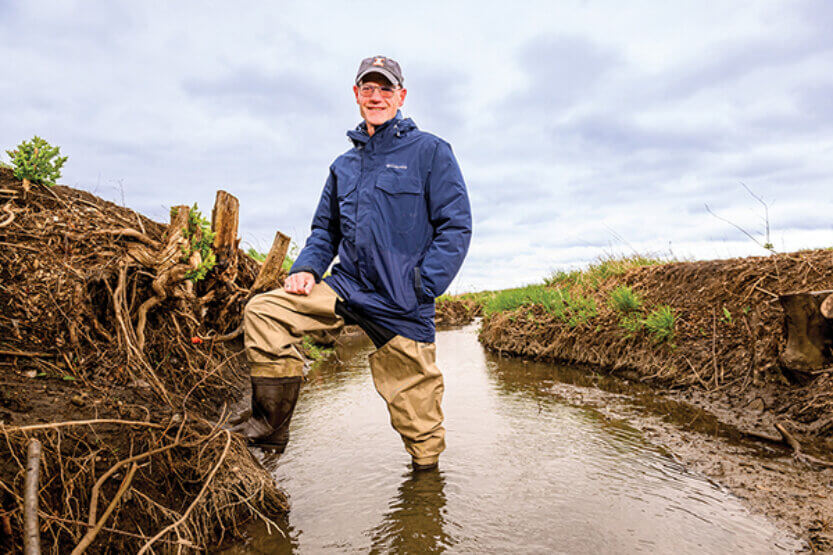In Class: River Runner
 Geography Professor Bruce Rhoads studies rivers and their importance to Earth, as well as the value of fish and the waters they live in. Rhoads stands at the site of a new research project looking at soil erosion and they impact on waterways. (Image by Fred Zwicky)
Geography Professor Bruce Rhoads studies rivers and their importance to Earth, as well as the value of fish and the waters they live in. Rhoads stands at the site of a new research project looking at soil erosion and they impact on waterways. (Image by Fred Zwicky) I am a geomorphologist by training. I study how rivers are natural agents of erosion and deposition on our planet. Earth is unique because of its large amount of surface water. Seventy percent of this planet is ocean. Rivers do more to change the terrestrial surface than wind, ice or coastal wave action. Our rivers are vital to how our planet works.
Humans have radically changed rivers and streams throughout [North America]; they straightened them and, in many cases, removed the natural vegetation cover. Now, farming goes right up to the edge of many streams. The runoff is much greater. The rivers are transporting more water and sediment, which leads to more flooding. Flooding can occur almost anywhere. In terms of loss of life and property, it is the number one natural hazard on the planet.
One of the things we are trying to understand is how sediment is being delivered to streams from the surrounding landscape. There may be places sediment is coming from in great quantities and other parts of the landscape that aren’t contributing very much. The conventional wisdom is that most of the sediment is coming from farm fields. But [there’s evidence that] a large amount of it is coming from the streams and rivers themselves through streambank erosion.
I’ve learned that science only goes so far because there’s only right or wrong if you value something or don’t value something. I use an example that’s kind of shocking to my students. I say, “Okay, a factory dumps pollution into a stream and it kills a bunch of fish. Is that good or bad?” And of course, their immediate reaction (as for most of us) is, “Oh, that’s bad. It’s killing a lot of fish!” And I say, “Yeah. But what if it’s your factory and you’re making a huge amount of money and you don’t care about fish, you just care about money?” Science can inform value systems. But value systems are set by the social/political/economic debates we have amongst each other within society.
The farming community in this part of the country is much more attuned to environmental versus economic dimensions than they were 30-some years ago. Environmental education played an important role in that change. It’s important to show connectivity, that what you do at one place may seem insignificant but can have broad, long-term ramifications.
Edited and condensed from an interview on March 9, 2023

